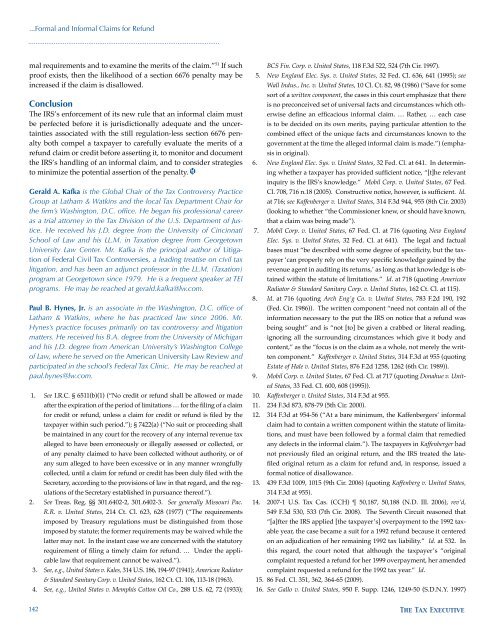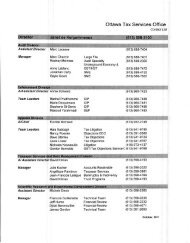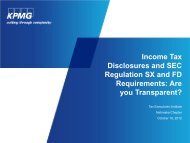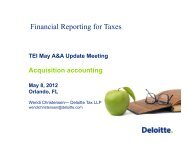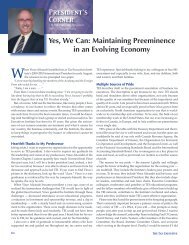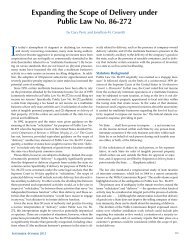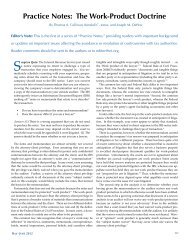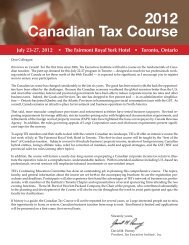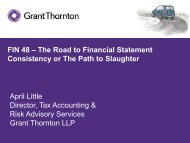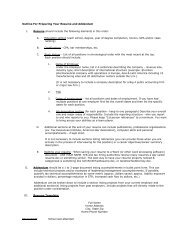recent Developments to Consider when Filing Formal and Informal ...
recent Developments to Consider when Filing Formal and Informal ...
recent Developments to Consider when Filing Formal and Informal ...
Create successful ePaper yourself
Turn your PDF publications into a flip-book with our unique Google optimized e-Paper software.
...<strong>Formal</strong> <strong>and</strong> <strong>Informal</strong> Claims for Refundmal requirements <strong>and</strong> <strong>to</strong> examine the merits of the claim.” 51 If suchproof exists, then the likelihood of a section 6676 penalty may beincreased if the claim is disallowed.ConclusionThe IRS’s enforcement of its new rule that an informal claim mustbe perfected before it is jurisdictionally adequate <strong>and</strong> the uncertaintiesassociated with the still regulation-less section 6676 penaltyboth compel a taxpayer <strong>to</strong> carefully evaluate the merits of arefund claim or credit before asserting it, <strong>to</strong> moni<strong>to</strong>r <strong>and</strong> documentthe IRS’s h<strong>and</strong>ling of an informal claim, <strong>and</strong> <strong>to</strong> consider strategies<strong>to</strong> minimize the potential assertion of the penalty.Gerald A. Kafka is the Global Chair of the Tax Controversy PracticeGroup at Latham & Watkins <strong>and</strong> the local Tax Department Chair forthe firm’s Washing<strong>to</strong>n, D.C. office. He began his professional careeras a trial at<strong>to</strong>rney in the Tax Division of the U.S. Department of Justice.He received his J.D. degree from the University of CincinnatiSchool of Law <strong>and</strong> his LL.M. in Taxation degree from George<strong>to</strong>wnUniversity Law Center. Mr. Kafka is the principal author of Litigationof Federal Civil Tax Controversies, a leading treatise on civil taxlitigation, <strong>and</strong> has been an adjunct professor in the LL.M. (Taxation)program at George<strong>to</strong>wn since 1979. He is a frequent speaker at TEIprograms. He may be reached at gerald.kafka@lw.com.Paul B. Hynes, Jr. is an associate in the Washing<strong>to</strong>n, D.C. office ofLatham & Watkins, where he has practiced law since 2006. Mr.Hynes’s practice focuses primarily on tax controversy <strong>and</strong> litigationmatters. He received his B.A. degree from the University of Michigan<strong>and</strong> his J.D. degree from American University’s Washing<strong>to</strong>n Collegeof Law, where he served on the American University Law Review <strong>and</strong>participated in the school’s Federal Tax Clinic. He may be reached atpaul.hynes@lw.com.1. See I.R.C. § 6511(b)(1) (“No credit or refund shall be allowed or madeafter the expiration of the period of limitations … for the filing of a claimfor credit or refund, unless a claim for credit or refund is filed by thetaxpayer within such period.”); § 7422(a) (“No suit or proceeding shallbe maintained in any court for the recovery of any internal revenue taxalleged <strong>to</strong> have been erroneously or illegally assessed or collected, orof any penalty claimed <strong>to</strong> have been collected without authority, or ofany sum alleged <strong>to</strong> have been excessive or in any manner wrongfullycollected, until a claim for refund or credit has been duly filed with theSecretary, according <strong>to</strong> the provisions of law in that regard, <strong>and</strong> the regulationsof the Secretary established in pursuance thereof.”).2. See Treas. Reg. §§ 301.6402-2, 301.6402-3. See generally Missouri Pac.R.R. v. United States, 214 Ct. Cl. 623, 628 (1977) (“The requirementsimposed by Treasury regulations must be distinguished from thoseimposed by statute; the former requirements may be waived while thelatter may not. In the instant case we are concerned with the statu<strong>to</strong>ryrequirement of filing a timely claim for refund. … Under the applicablelaw that requirement cannot be waived.”).3. See, e.g., United States v. Kales, 314 U.S. 186, 194-97 (1941); American Radia<strong>to</strong>r& St<strong>and</strong>ard Sanitary Corp. v. United States, 162 Ct. Cl. 106, 113-18 (1963).4. See, e.g., United States v. Memphis Cot<strong>to</strong>n Oil Co., 288 U.S. 62, 72 (1933);BCS Fin. Corp. v. United States, 118 F.3d 522, 524 (7th Cir. 1997).5. New Engl<strong>and</strong> Elec. Sys. v. United States, 32 Fed. Cl. 636, 641 (1995); seeWall Indus., Inc. v. United States, 10 Cl. Ct. 82, 98 (1986) (“Save for somesort of a written component, the cases in this court emphasize that thereis no preconceived set of universal facts <strong>and</strong> circumstances which otherwisedefine an efficacious informal claim. … Rather, … each caseis <strong>to</strong> be decided on its own merits, paying particular attention <strong>to</strong> thecombined effect of the unique facts <strong>and</strong> circumstances known <strong>to</strong> thegovernment at the time the alleged informal claim is made.”) (emphasisin original).6. New Engl<strong>and</strong> Elec. Sys. v. United States, 32 Fed. Cl. at 641. In determiningwhether a taxpayer has provided sufficient notice, “[t]he relevantinquiry is the IRS’s knowledge.” Mobil Corp. v. United States, 67 Fed.Cl. 708, 716 n.18 (2005). Constructive notice, however, is sufficient. Id.at 716; see Kaffenberger v. United States, 314 F.3d 944, 955 (8th Cir. 2003)(looking <strong>to</strong> whether “the Commissioner knew, or should have known,that a claim was being made”).7. Mobil Corp. v. United States, 67 Fed. Cl. at 716 (quoting New Engl<strong>and</strong>Elec. Sys. v. United States, 32 Fed. Cl. at 641). The legal <strong>and</strong> factualbases must “be described with some degree of specificity, but the taxpayer‘can properly rely on the very specific knowledge gained by therevenue agent in auditing its returns,’ as long as that knowledge is obtainedwithin the statute of limitations.” Id. at 718 (quoting AmericanRadia<strong>to</strong>r & St<strong>and</strong>ard Sanitary Corp. v. United States, 162 Ct. Cl. at 115).8. Id. at 716 (quoting Arch Eng’g Co. v. United States, 783 F.2d 190, 192(Fed. Cir. 1986)). The written component “need not contain all of theinformation necessary <strong>to</strong> the put the IRS on notice that a refund wasbeing sought” <strong>and</strong> is “not [<strong>to</strong>] be given a crabbed or literal reading,ignoring all the surrounding circumstances which give it body <strong>and</strong>content,” as the “focus is on the claim as a whole, not merely the writtencomponent.” Kaffenberger v. United States, 314 F.3d at 955 (quotingEstate of Hale v. United States, 876 F.2d 1258, 1262 (6th Cir. 1989)).9. Mobil Corp. v. United States, 67 Fed. Cl. at 717 (quoting Donahue v. UnitedStates, 33 Fed. Cl. 600, 608 (1995)).10. Kaffenberger v. United States, 314 F.3d at 955.11. 234 F.3d 873, 878-79 (5th Cir. 2000).12. 314 F.3d at 954-56 (“At a bare minimum, the Kaffenbergers’ informalclaim had <strong>to</strong> contain a written component within the statute of limitations,<strong>and</strong> must have been followed by a formal claim that remediedany defects in the informal claim.”). The taxpayers in Kaffenberger hadnot previously filed an original return, <strong>and</strong> the IRS treated the latefiledoriginal return as a claim for refund <strong>and</strong>, in response, issued aformal notice of disallowance.13. 439 F.3d 1009, 1015 (9th Cir. 2006) (quoting Kaffenberg v. United States,314 F.3d at 955).14. 2007-1 U.S. Tax Cas. (CCH) 50,187, 50,188 (N.D. Ill. 2006), rev’d,549 F.3d 530, 533 (7th Cir. 2008). The Seventh Circuit reasoned that“[a]fter the IRS applied [the taxpayer’s] overpayment <strong>to</strong> the 1992 taxableyear, the case became a suit for a 1992 refund because it centeredon an adjudication of her remaining 1992 tax liability.” Id. at 532. Inthis regard, the court noted that although the taxpayer’s “originalcomplaint requested a refund for her 1999 overpayment, her amendedcomplaint requested a refund for the 1992 tax year.” Id.15. 86 Fed. Cl. 351, 362, 364-65 (2009).16. See Gallo v. United States, 950 F. Supp. 1246, 1249-50 (S.D.N.Y. 1997)142The Tax Executive


